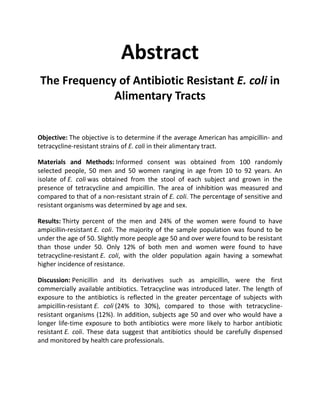Abstract
- 1. Abstract The Frequency of Antibiotic Resistant E. coli in Alimentary Tracts Objective: The objective is to determine if the average American has ampicillin- and tetracycline-resistant strains of E. coli in their alimentary tract. Materials and Methods: Informed consent was obtained from 100 randomly selected people, 50 men and 50 women ranging in age from 10 to 92 years. An isolate of E. coli was obtained from the stool of each subject and grown in the presence of tetracycline and ampicillin. The area of inhibition was measured and compared to that of a non-resistant strain of E. coli. The percentage of sensitive and resistant organisms was determined by age and sex. Results: Thirty percent of the men and 24% of the women were found to have ampicillin-resistant E. coli. The majority of the sample population was found to be under the age of 50. Slightly more people age 50 and over were found to be resistant than those under 50. Only 12% of both men and women were found to have tetracycline-resistant E. coli, with the older population again having a somewhat higher incidence of resistance. Discussion: Penicillin and its derivatives such as ampicillin, were the first commercially available antibiotics. Tetracycline was introduced later. The length of exposure to the antibiotics is reflected in the greater percentage of subjects with ampicillin-resistant E. coli (24% to 30%), compared to those with tetracycline- resistant organisms (12%). In addition, subjects age 50 and over who would have a longer life-time exposure to both antibiotics were more likely to harbor antibiotic resistant E. coli. These data suggest that antibiotics should be carefully dispensed and monitored by health care professionals.
- 2. Abstract The Effect of Surface Finish on Rocket Drag Objective: My project was to determine if surface finish has an effect on the drag of a model rocket. I believe that a model with a smooth surface will have lower drag and will reach higher altitudes. Materials and Methods: Five model rockets with identical size and shape, but different surface preparations, were constructed. One rocket was left with an unfinished surface, three had surfaces finished to various degrees of smoothness, and the fifth rocket had its surface sealed, primed, sanded to 600 grit, painted, and covered with clear gloss. The rockets were ballasted to weigh the same and flown 10 times each with B5-4 motors. Results: The rocket with the clear gloss finish consistently reached the highest altitudes of all 5 rockets, while the unfinished rocket consistently reached the lowest altitude. Conclusions: My conclusion is that surface finish has an important role in model rocket drag and rockets with carefully prepared surfaces will reach higher altitudes.


